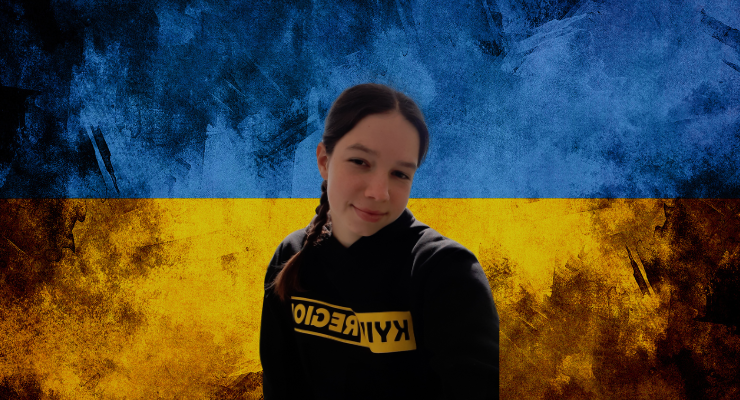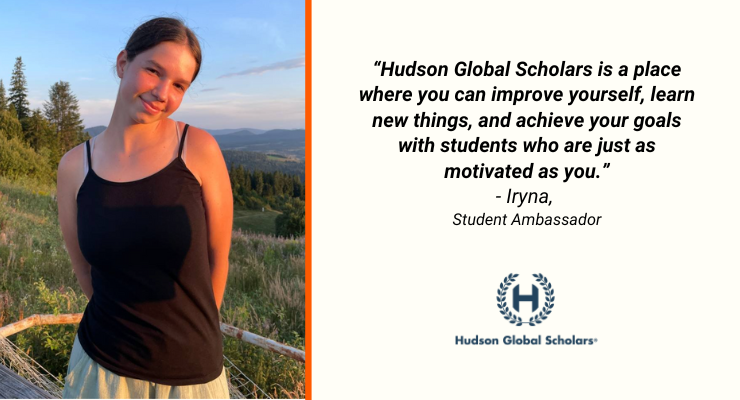Learning In a War Zone
Hudson Global Scholars supports students who live in regions where violence and chaos make classroom learning dangerous and even impossible.

Imagine you’re a child living in a war zone.
Bomb strikes shake the ground. Your friends move away. There are long periods—from 24 hours to several weeks—when your school has no electricity. You can’t get textbooks because supply chains are broken. Your teachers leave school to join the military.
You dream of going to university, getting a job, and moving into your own apartment, but instead, your life is in turmoil, and your very existence is threatened by violence.
This is the reality of an estimated 473 million children worldwide, the highest number since WWII.* In Africa, for example, roughly 14,000 schools are closed, affecting 2.8 million children. In Gaza, 625,000 primary and secondary students are out of school, with nearly 93% of schools damaged or destroyed.
Who’s helping these children and their families plan for a brighter future?
Hudson Global Scholars is an online educator that helps children in war-torn regions stay on top of their studies by providing them with online courses and one-to-one interaction with teachers and academic counselors. HGS is currently supporting students in Myanmar and Ukraine and is constantly seeking ways to help students in other areas of the world as part of its outreach efforts.
“We know that we can help students to achieve the results they need to move forward in their lives—no matter how grim it is in their home country,” says Bruce Davis, CEO of Hudson Global Scholars. “We have extremely motivated and caring teachers and pedagogical teams who move mountains for these kids. That, plus the dedication of our tech team, means there’s no challenge we can’t overcome. We believe in these kids and do everything we can to keep them learning.”

A lifeline to a brighter future
HGS has been working with Iryna, a Ukrainian student, for several years. She is part of Hudson’s U.S. Dual Diploma program offered by the Optima School, a distance-learning institution that helps Ukrainian children keep up with their studies. Students in this program study 100% online.
“I’m lucky compared to other students because I study at home on my computer,” Iryna says. “Many of my friends miss entire days at school. There are no lessons. They just miss out.”
There are 3.7 million school-aged children in Ukraine. Ensuring that these children continue to progress in math, science, and languages is challenging. Classes have been repeatedly interrupted since the start of the war, leaving many students far behind academically. Ukrainian education officials also report that children are losing soft skills such as communication and conflict resolution because they are often cut off from their classmates.
Most students attend school in person for one or more days a week and study online the rest of the time. In dangerous parts of the country, teachers and their students work on Algebra and review grammar rules in bomb shelters. According to the ministry of education, 14% of children studying the Ukrainian curriculum do so entirely online, including about 300,000 joining lessons from abroad**.
For Iryna, learning is like breathing; she needs it to learn to survive. Since the beginning of the conflict, she has continued studying with HGS and meeting with teachers to discuss her courses, academic projects, and grades. Her favorite course is English because her teacher, Mrs. Thompson, is rigorous about grammar and sentence structure and encourages students to write comparative essays.
“Learning is one of the things that motivates me the most in life,” says Iryna. “I want a happy life, but not only that. I want to have a good job and money so that I can show my parents how grateful I am to them for all they have done for me. I want to give them anything they want.”
Iryna also studies website design with HGS. For her final project, she created a website for her orienteering club. This project made Iryna feel proud of herself and the new skills she had acquired, thanks to the class. In addition, Iryna is a top student who was selected to be a Student Ambassador, an opportunity that develops her leadership skills among her peers. She really enjoys participating in HGS’s online global student community and says that she would advise her classmates to participate to develop friendships with other students.
“I would recommend it to friends if they wanted to find a new acquaintance from around the world. Besides it is really good way to learn and practice some new skills.
Providing stability during uncertain times
When working with students in war-torn regions, Hudson Global Scholars’ teachers and staff pay close attention to their emotional well-being. They are sensitive to the students’ needs and set aside time to talk about what’s going on at home and how they are coping with the anxiety of witnessing warfare and violent struggle.
As Hudson teacher Louise Jackson explains, “I try to find out more about their hobbies and favorite things in my opening/ice breaker. Occasionally a topic comes up where the students will mention something happening due to the war and we all listen. I have omitted a lesson that related to Media in Wars. I try to be more understanding on overdue assignments and really make light of any issues with Internet so they aren’t worried.”
Other teachers encourage students to write about their experiences, for personal reflection, openings for discussion, or academic research projects. “In English I, for example, students write nonfiction narratives,” says Hudson teacher Cheryl Thompson. “Many of them write about their families leaving Ukraine and trying to feel at home in new countries. Others write about the trauma of seeing their villages and towns changed. Iryna is in my English II class where she just finished an amazing essay on the United Nations. She told me she loved this assignment and loved diving into the research aspect of it.”
This support has made it easier for Iryna to handle specific moments in her family’s recent history. For example, when the family was forced to leave Ukraine and move to the Czech Republic, Iryna was happy that she could still meet with her HGS teachers and spend a few hours a day with them.
“When we moved to the Czech Republic, I told my parents that I could stop my online courses so we could save money,” she recalls. “But they encouraged me to continue; they were very supportive.”
HGS has worked with Optima, Ukraine’s first and largest distance learning school, since 2021. The school serves more than 200,000 children and offers elementary school through college-level programs.
Iryna is happy that the adults in her life recognize her potential. She says her parents don’t mind financially supporting her online studies because they know that she is taking full advantage of the opportunities they offer.
“I’ve always been a responsible girl, and they know that I want to have a good future,” she says of her parents.
In the future, Iryna hopes to study math and technology at a Ukrainian university. She wants to stay in her native country and contribute to its rebuilding. She is thankful that her dreams have not been derailed.
“I know that the skills and knowledge I have picked up with Hudson Global Scholars will help me to succeed,” she says. “I know that these years have not been wasted and that I have benefited from every opportunity I had to meet students and teachers from around the world.”
* Almost one in five children live in conflict zones, says Unicef | Children | The Guardian
** https://www.nytimes.com/2025/02/08/world/europe/ukraine-russia-war-education.html

Recent Comments